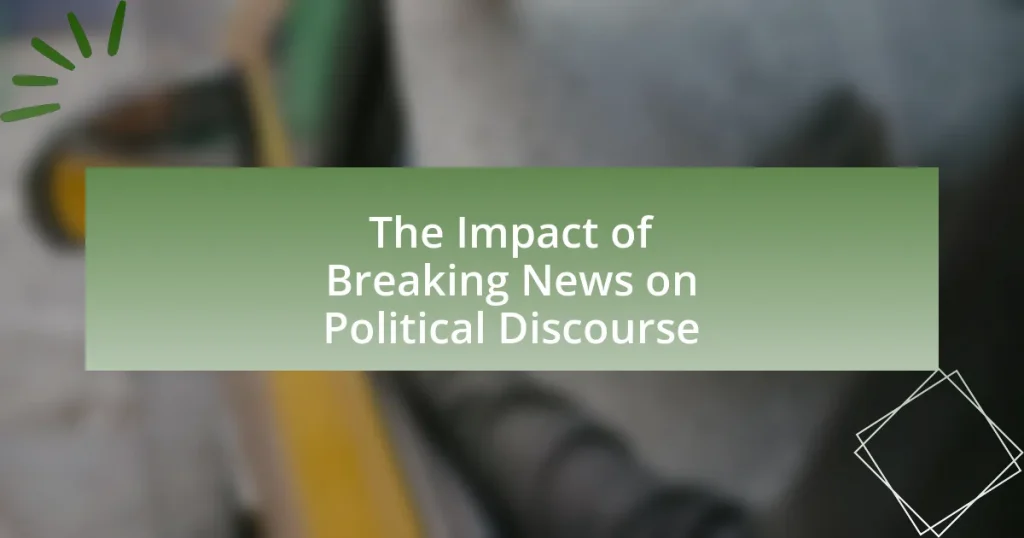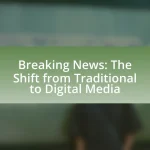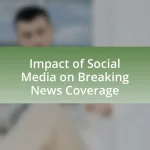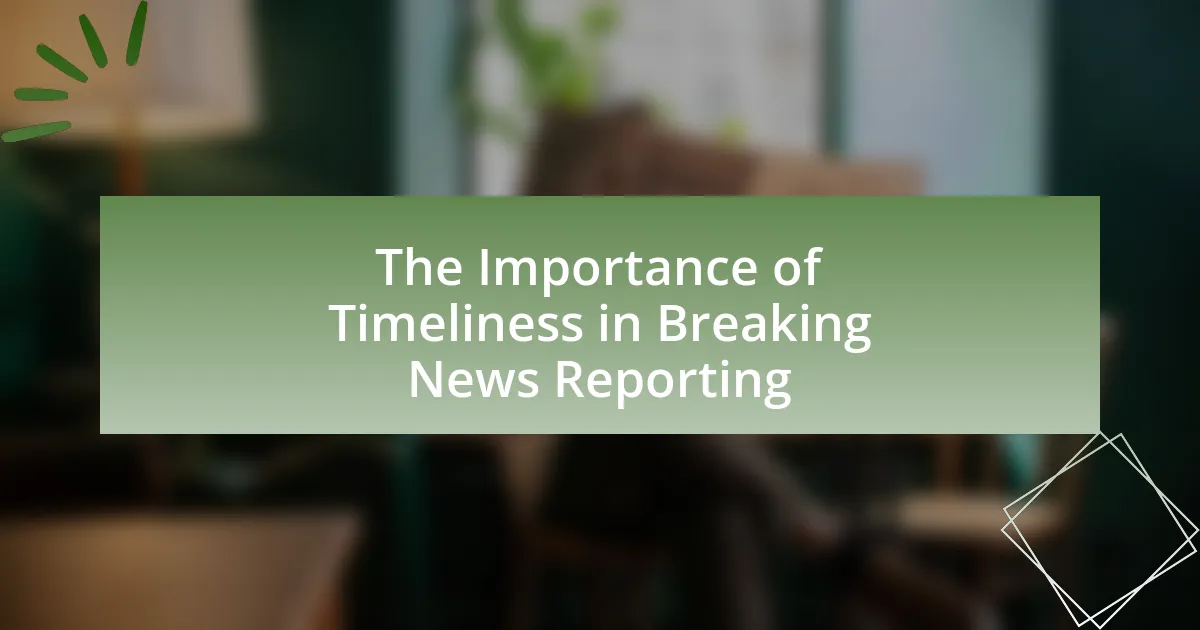The article examines the impact of breaking news on political discourse, highlighting its role in shaping public opinion and influencing political narratives. It discusses how the immediacy of breaking news can mobilize public sentiment, prompt rapid responses from political figures, and create a sense of urgency that alters political debates. Key mechanisms such as agenda-setting, framing, and priming are explored, along with the challenges of misinformation and polarization that arise from the fast-paced nature of breaking news. The article also emphasizes the importance of media literacy and critical evaluation of sources to navigate the complexities of breaking news in the political landscape.
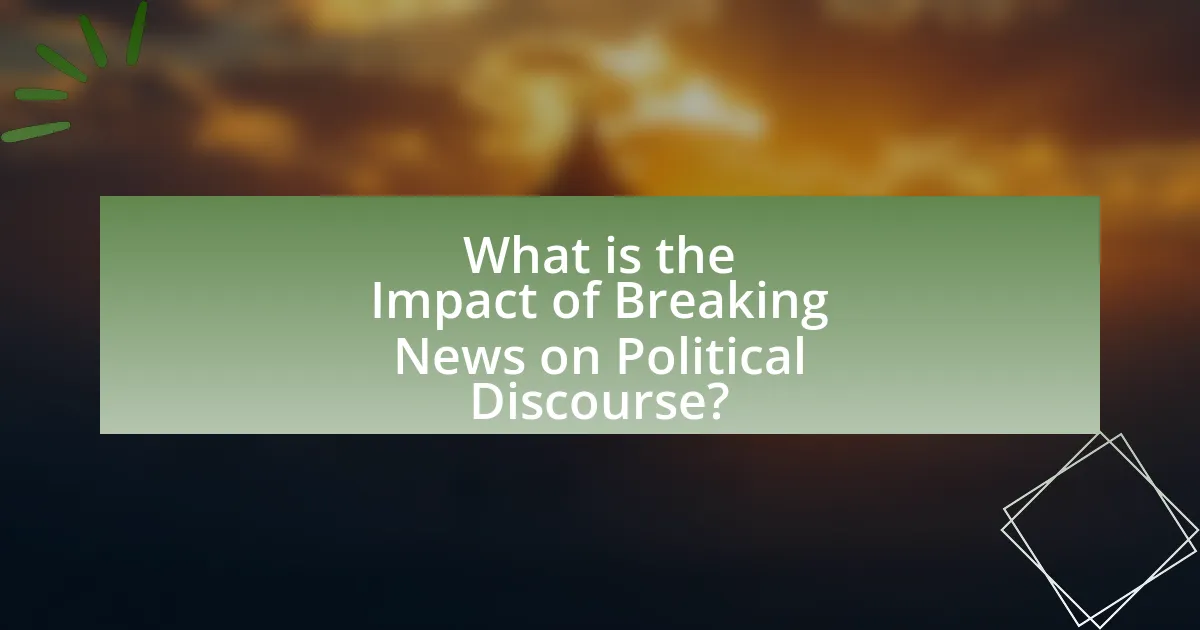
What is the Impact of Breaking News on Political Discourse?
Breaking news significantly influences political discourse by shaping public opinion and framing political narratives. The immediacy of breaking news often leads to rapid dissemination of information, which can mobilize public sentiment and prompt immediate reactions from political figures. For instance, studies have shown that events covered as breaking news can lead to spikes in social media engagement, where users express their views and share opinions, thereby amplifying the discourse surrounding political issues. Additionally, breaking news can create a sense of urgency, compelling politicians to respond quickly, which can alter the trajectory of political debates and policy discussions. This dynamic interaction between breaking news and political discourse underscores the media’s role in shaping democratic engagement and influencing electoral outcomes.
How does breaking news influence public opinion in politics?
Breaking news significantly influences public opinion in politics by shaping perceptions and attitudes in real-time. The immediacy of breaking news can lead to rapid shifts in public sentiment, as seen during major events like elections or crises, where information dissemination occurs at unprecedented speeds. For instance, a study by the Pew Research Center found that 62% of Americans reported that breaking news affects their views on political issues, highlighting the direct correlation between news coverage and public opinion. Additionally, breaking news often frames political narratives, which can sway voter behavior and policy support, as evidenced by the impact of live coverage during the 2016 U.S. presidential election, where candidates’ responses to unfolding events were scrutinized and influenced voter perceptions.
What role does immediacy play in shaping political narratives?
Immediacy plays a crucial role in shaping political narratives by influencing public perception and response to events as they unfold. When news is reported in real-time, it creates a sense of urgency that can sway opinions and mobilize action, often leading to rapid shifts in political discourse. For instance, during the Arab Spring, social media platforms facilitated immediate reporting of protests, which not only informed global audiences but also galvanized local support, demonstrating how immediacy can amplify political movements. This phenomenon underscores the power of timely information in framing narratives and affecting political outcomes.
How do emotional responses to breaking news affect political views?
Emotional responses to breaking news significantly influence political views by shaping individuals’ perceptions and reactions to political issues. When people experience strong emotions such as fear, anger, or empathy in response to breaking news, they are more likely to adopt polarized political stances. Research indicates that emotionally charged news can lead to increased engagement with political content, often reinforcing existing beliefs and biases. For instance, a study published in the journal “Political Psychology” by Brader (2006) found that emotionally evocative news stories can mobilize voters and alter their opinions on specific policies, demonstrating the direct correlation between emotional reactions and shifts in political views.
Why is breaking news significant in the context of political discourse?
Breaking news is significant in the context of political discourse because it shapes public perception and influences political agendas in real-time. The immediacy of breaking news allows for rapid dissemination of information, which can sway public opinion and mobilize political action. For instance, events such as elections or crises often see a surge in breaking news coverage, which can lead to shifts in voter sentiment or policy discussions. Research indicates that 70% of Americans report that breaking news affects their views on political issues, highlighting its role in shaping discourse.
What historical examples illustrate the impact of breaking news on politics?
The Watergate scandal exemplifies the significant impact of breaking news on politics, as investigative journalism led to the resignation of President Richard Nixon in 1974. The Washington Post’s reporting on the scandal, particularly by journalists Bob Woodward and Carl Bernstein, uncovered a series of abuses of power and cover-ups that ultimately shifted public opinion and prompted congressional investigations. This event illustrates how timely and accurate reporting can catalyze political accountability and change. Another example is the coverage of the Vietnam War, where graphic images and reports broadcasted in real-time shifted public sentiment against the war, influencing political decisions and leading to a change in U.S. foreign policy. These instances demonstrate that breaking news can directly alter political landscapes and public perceptions.
How does breaking news differ from regular news in political contexts?
Breaking news in political contexts is characterized by its immediacy and urgency, often reporting on events as they unfold, while regular news typically provides analysis and context after events have occurred. This immediacy can lead to heightened emotional responses and rapid public discourse, as seen during significant political events like elections or crises, where breaking news can shape public opinion and influence political decisions in real-time. For instance, during the 2020 U.S. presidential election, breaking news updates on vote counts and candidate speeches significantly impacted voter perceptions and media narratives, demonstrating how the nature of breaking news can alter the political landscape more dynamically than regular news coverage.
What are the mechanisms through which breaking news affects political discourse?
Breaking news affects political discourse primarily through agenda-setting, framing, and priming mechanisms. Agenda-setting occurs when media coverage highlights specific issues, influencing public perception of their importance; for instance, the extensive coverage of a political scandal can elevate it in public consciousness, prompting discussions and debates. Framing shapes how issues are interpreted by presenting them in particular contexts, such as portraying a protest as a fight for justice or as a public disturbance, which can sway public opinion and political alignment. Priming prepares the audience to evaluate political figures or policies based on recent news, as seen when voters consider a candidate’s response to a crisis as a measure of their leadership capabilities. These mechanisms collectively shape the narratives and discussions within political discourse, guiding public opinion and influencing political behavior.
How do social media platforms amplify the effects of breaking news?
Social media platforms amplify the effects of breaking news by enabling rapid dissemination and engagement among users. These platforms facilitate real-time sharing, allowing news to reach a global audience almost instantaneously, which increases visibility and urgency. For instance, a study by the Pew Research Center found that 62% of adults in the U.S. get news from social media, highlighting its role as a primary news source. Additionally, algorithms prioritize trending topics, further enhancing the reach of breaking news stories. This combination of speed and algorithmic promotion leads to heightened public discourse and can influence political opinions and actions significantly.
What is the role of traditional media in disseminating breaking news?
Traditional media plays a crucial role in disseminating breaking news by providing timely and reliable information to the public. This includes television, radio, and print outlets that have established protocols for reporting urgent events, ensuring that audiences receive updates quickly and accurately. For instance, during significant events like natural disasters or political upheavals, traditional media outlets often mobilize resources to cover the story live, offering real-time updates and expert analysis. According to a Pew Research Center study, 57% of Americans often get their news from television, highlighting the continued relevance of traditional media in shaping public awareness and discourse.
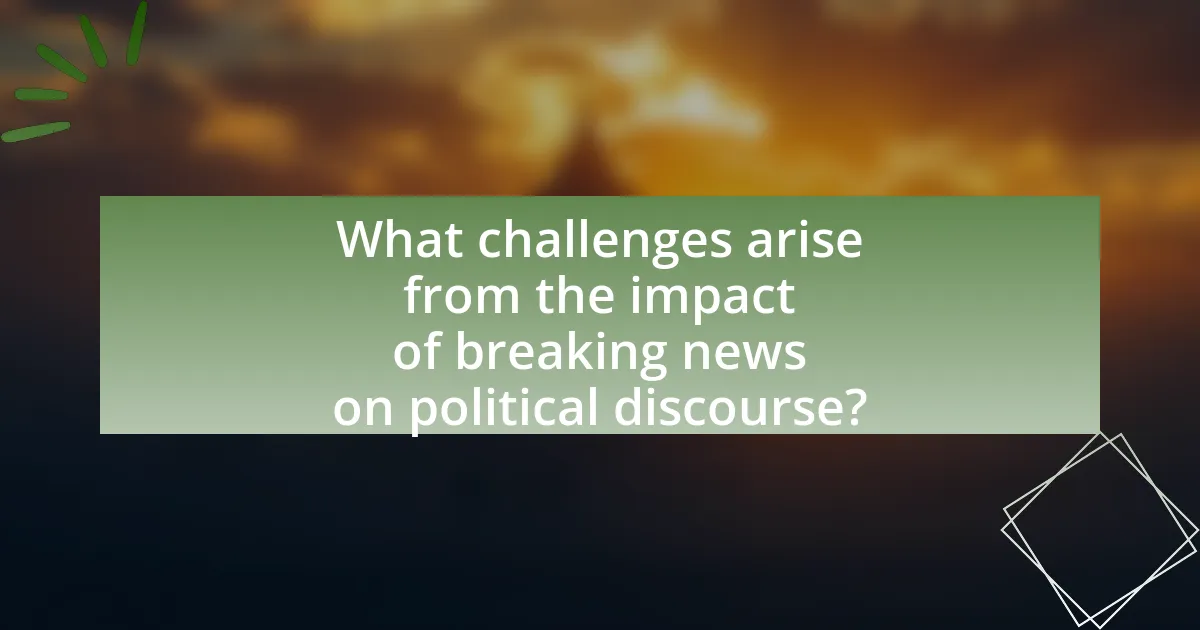
What challenges arise from the impact of breaking news on political discourse?
The challenges arising from the impact of breaking news on political discourse include the spread of misinformation, the polarization of opinions, and the rapid pace of news cycles that can hinder thoughtful discussion. Misinformation can quickly circulate through social media platforms, leading to public confusion and misinformed opinions, as evidenced by studies showing that false information spreads six times faster than true information. Additionally, breaking news often emphasizes sensationalism, which can exacerbate political polarization by framing issues in a divisive manner, as seen in the coverage of contentious political events. The fast-paced nature of breaking news can also result in superficial analysis, where complex issues are oversimplified, preventing in-depth understanding and critical engagement among the public.
How does misinformation spread through breaking news?
Misinformation spreads through breaking news primarily due to the rapid dissemination of unverified information across various media platforms. When breaking news occurs, news outlets often prioritize speed over accuracy, leading to the release of incomplete or misleading information. A study by the Massachusetts Institute of Technology found that false news stories are 70% more likely to be retweeted than true stories, highlighting how sensationalism and urgency can amplify misinformation. Additionally, social media algorithms favor engaging content, which often includes sensational or misleading headlines, further propagating false narratives. This combination of urgency, incomplete reporting, and algorithmic amplification creates an environment where misinformation can thrive during breaking news events.
What are the consequences of misinformation on public perception?
Misinformation significantly distorts public perception by shaping beliefs and attitudes based on false or misleading information. This distortion can lead to increased polarization, as individuals may align more strongly with misinformation that confirms their pre-existing biases, resulting in a divided public opinion. Research from the Pew Research Center indicates that 64% of Americans believe that misinformation has caused confusion about basic facts, which undermines trust in media and institutions. Furthermore, misinformation can influence voting behavior and policy support, as seen in the 2016 U.S. presidential election, where false narratives affected voter decisions.
How can fact-checking mitigate the effects of misinformation?
Fact-checking can mitigate the effects of misinformation by providing accurate information that counters false claims. When fact-checkers analyze and verify the accuracy of statements made in breaking news, they help to clarify the truth for the public, reducing the spread of false narratives. For instance, a study by the Pew Research Center found that fact-checking can significantly influence public perception, as individuals exposed to fact-checked information are more likely to adjust their beliefs in accordance with the verified facts. This process not only informs the audience but also holds media outlets and public figures accountable, thereby fostering a more informed political discourse.
What are the ethical considerations in reporting breaking news?
Ethical considerations in reporting breaking news include accuracy, fairness, and the potential impact on individuals and communities. Journalists must ensure that information is verified before dissemination to avoid spreading misinformation, which can lead to public panic or misinterpretation of events. Fairness requires presenting multiple perspectives, especially in politically charged situations, to avoid bias that could influence public opinion. Additionally, respecting the privacy and dignity of individuals involved in breaking news stories is crucial, as sensationalism can cause harm. The Society of Professional Journalists emphasizes these principles in its Code of Ethics, highlighting the responsibility of journalists to serve the public with integrity and accountability.
How do journalists balance speed and accuracy in breaking news reporting?
Journalists balance speed and accuracy in breaking news reporting by implementing rigorous verification processes while utilizing real-time information technologies. They prioritize gathering essential facts quickly but ensure that these facts are corroborated through multiple reliable sources before publication. For instance, the Associated Press employs a strict set of guidelines that require reporters to confirm information with at least two independent sources, which helps maintain accuracy even under tight deadlines. This dual focus on speed and verification is crucial, as studies show that inaccurate reporting can lead to misinformation, which significantly impacts public perception and political discourse.
What responsibilities do media outlets have in shaping political discourse?
Media outlets have the responsibility to provide accurate, balanced, and timely information that informs the public and fosters healthy political discourse. This responsibility includes fact-checking claims, presenting diverse viewpoints, and avoiding sensationalism, which can distort public perception and influence political opinions. For instance, studies have shown that misinformation can lead to polarized views, as seen during the 2016 U.S. presidential election, where false narratives spread rapidly through social media and traditional news channels. By adhering to journalistic standards and ethical guidelines, media outlets can contribute to a more informed electorate and a more constructive political environment.
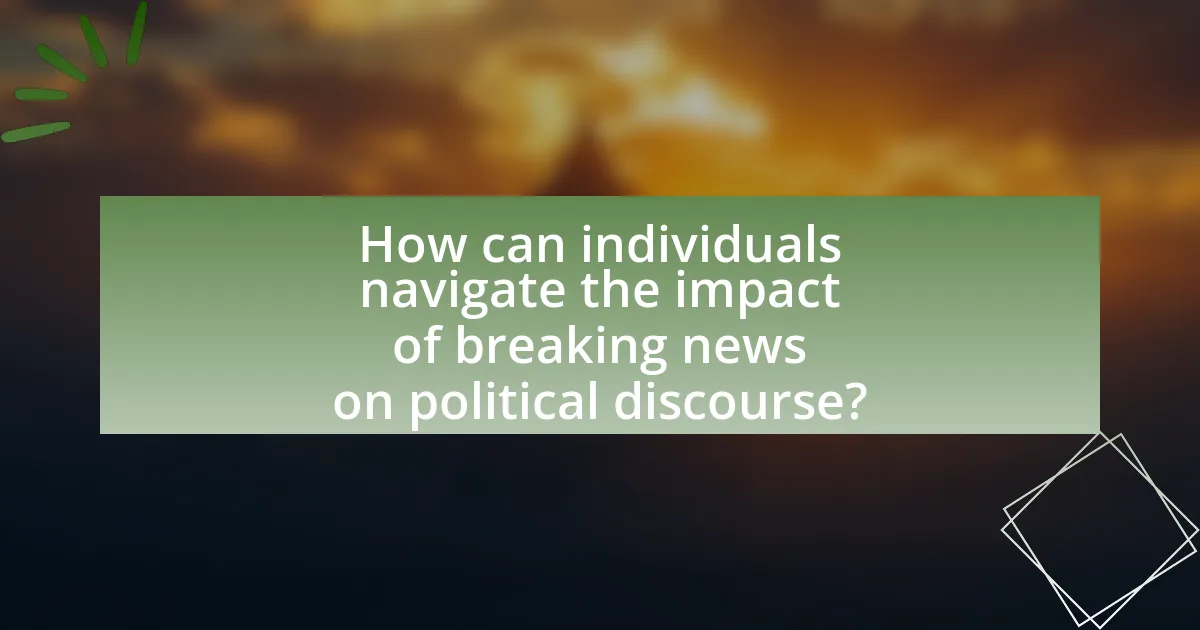
How can individuals navigate the impact of breaking news on political discourse?
Individuals can navigate the impact of breaking news on political discourse by critically evaluating the sources and content of the news. Engaging with multiple reputable news outlets helps to provide a balanced perspective, reducing the risk of misinformation. Research indicates that exposure to diverse viewpoints can enhance understanding and foster constructive dialogue, as seen in studies by the Pew Research Center, which found that individuals who consume news from various sources are more informed about political issues. Additionally, practicing media literacy skills, such as identifying bias and fact-checking claims, empowers individuals to discern credible information, thereby contributing to a more informed political discourse.
What strategies can individuals use to critically evaluate breaking news?
Individuals can critically evaluate breaking news by employing strategies such as cross-referencing multiple reputable sources, analyzing the credibility of the information, and assessing the context of the news. Cross-referencing involves checking facts against established news outlets, academic publications, or official statements to verify accuracy. Analyzing credibility includes examining the author’s qualifications, the publication’s reputation, and potential biases in the reporting. Assessing context requires understanding the broader implications of the news, including historical background and the potential influence on political discourse. These strategies help individuals discern factual reporting from misinformation, which is crucial in a rapidly evolving news landscape.
How can media literacy improve understanding of breaking news?
Media literacy enhances understanding of breaking news by equipping individuals with the skills to critically analyze and evaluate information sources. This critical analysis allows people to discern credible news from misinformation, which is crucial during fast-paced news cycles where accuracy can be compromised. Research indicates that individuals with higher media literacy are better at identifying biased reporting and recognizing the influence of framing on public perception, thereby fostering informed political discourse. For instance, a study by the Pew Research Center found that media-savvy individuals are more likely to seek diverse viewpoints, leading to a more nuanced understanding of complex political issues.
What tools are available for fact-checking breaking news stories?
Tools available for fact-checking breaking news stories include Snopes, FactCheck.org, and PolitiFact. These platforms provide verification of claims made in news articles and social media posts by cross-referencing information with credible sources. For instance, Snopes has been operational since 1994 and is widely recognized for debunking misinformation through thorough research and sourcing. FactCheck.org, established by the Annenberg Public Policy Center, focuses on political claims and provides detailed analyses of statements made by public figures. PolitiFact, a project of the Tampa Bay Times, rates the accuracy of claims on a Truth-O-Meter scale, helping users quickly assess the reliability of information. These tools are essential for maintaining informed political discourse by ensuring that the information disseminated during breaking news events is accurate and trustworthy.
What best practices should individuals follow when engaging with breaking news?
Individuals should verify the credibility of sources when engaging with breaking news. This involves cross-referencing information with established news organizations and fact-checking websites to ensure accuracy. Research indicates that misinformation can spread rapidly during breaking news events, leading to public confusion and misinterpretation of facts. For instance, a study by the Pew Research Center found that 64% of Americans believe that fabricated news stories cause confusion about the basic facts of current events. Therefore, relying on reputable sources and confirming details before sharing or reacting to breaking news is essential for informed political discourse.
How can one maintain a balanced perspective amidst breaking news coverage?
To maintain a balanced perspective amidst breaking news coverage, one should critically evaluate multiple sources of information. Engaging with diverse media outlets helps to counteract bias, as studies indicate that exposure to varied viewpoints can enhance understanding and reduce polarization in political discourse. For instance, research by the Pew Research Center shows that individuals who consume news from a range of sources are more likely to have a nuanced view of complex issues. Additionally, fact-checking organizations can provide clarity on the accuracy of claims made in breaking news, further supporting a balanced perspective.
What role does community discussion play in understanding breaking news?
Community discussion plays a crucial role in understanding breaking news by facilitating diverse perspectives and enhancing information dissemination. When individuals engage in discussions, they share insights, clarify misunderstandings, and provide context that may not be present in initial news reports. This collective dialogue can lead to a more nuanced understanding of events, as evidenced by studies showing that community forums and social media platforms often serve as spaces for real-time information exchange, allowing users to fact-check and corroborate news stories. For instance, research from the Pew Research Center indicates that 62% of social media users engage with news content through discussions, which can significantly influence public perception and interpretation of breaking news events.
